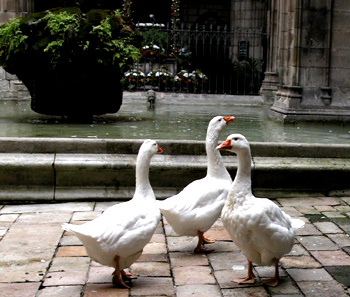

You duck for cover as one of the geese, honking loudly and flapping his wings, runs at you with hostile intent. You dare not strike these sacred birds of Juno, because they are under the protection of Rome in eternal thanksgiving for their role in saving the Capitoline, and hence the state of Rome itself, from the Gauls in 390 BCE. The Gauls had invaded the city and taken everything except the Capitoline, where the Romans had gathered under seige. Even this stronghold would have fallen had it not been for the noise of Juno's geese. Livy tells the story in Ab Urbe Condita 5. 47:
Dum haec Veiis agebantur, interim arx Romae Capitoliumque in ingenti periculo fuit. Namque Galli, seu vestigio notato humano qua nuntius a Veiis pervenerat seu sua sponte animadverso ad Carmentis saxo in adscensum aequo, nocte sublustri cum primo inermem qui temptaret viam praemisissent, tradentes inde arma . . . tanto silentio in summum evasere ut non custodes solum fallerent, sed ne canes quidem, sollicitum animal ad nocturnos strepitus, excitarent. Anseres non fefellere quibus sacris Iunonis in summa inopia cibi tamen abstinebatur. Quae res saluti fuit; namque clangore eorum alarumque crepitu excitus M. Manlius qui triennio ante consul fuerat, vir bello egregius, armis arreptis simul ad arma ceteros ciens vadit et dum ceteri trepidant, Gallum qui iam in summo constiterat umbone ictum deturbat. Cuius casus prolapsi cum proximos sterneret, trepidantes alios armisque omissis saxa quibus adhaerebant manibus amplexos trucidat. Iamque et alii congregati telis missilibusque saxis proturbare hostes, ruinaque tota prolapsa acies in praeceps deferri.
"While these things were happening at Veii, meanwhile the Arx and the Capitoline were in immense danger. For the Gauls (whether they had found the footprints where the messenger from Veii had come or whether they had noticed of their own accord that the rock near the shrine of Carmenta offered an easy climb) had sent in advance an unarmed man who tried out the route by night with the first faint light; after this they climbed up to the summit carrying their weapons in such silence . . . that not only did they deceive the guards, but they did not even wake the dogs, an animal easily roused to noctural barking. But they did not escape the notice of the geese which, as sacred birds of Juno, people were keeping away from even amid the very great scarcity of food. This circumstance led to salvation, for Marcus Manlius, an outstanding soldier who had been consul three years previously, was awakened by their cackling and the flapping of their wings. As soon as he had snatched up his weapons, he advanced, calling the others to arms. While the others were still scurrying about, he toppled over the Gaul who had already climbed on the summit by striking him with the boss of his shield. When the fall of this man hurtling down overthrew those immediately behind him, Manlius slaughtered others, who were thrown into confusion and were grasping the rocks to which they clung with their hands after their weapons had been cast aside. And now the other Romans, finally assembled, drove off the enemy with javelins and thrown rocks, and the whole line of enemy troops, hurtling in steep fall to the bottom of the cliff, was brought down."
This photo shows the geese in the cloisters of the Barcelona Cathedral in Spain; legend has it that they are kept here in remembrance of the sacred geese in Rome, harking back to the origin of this city as the Roman colonia of Barcino.